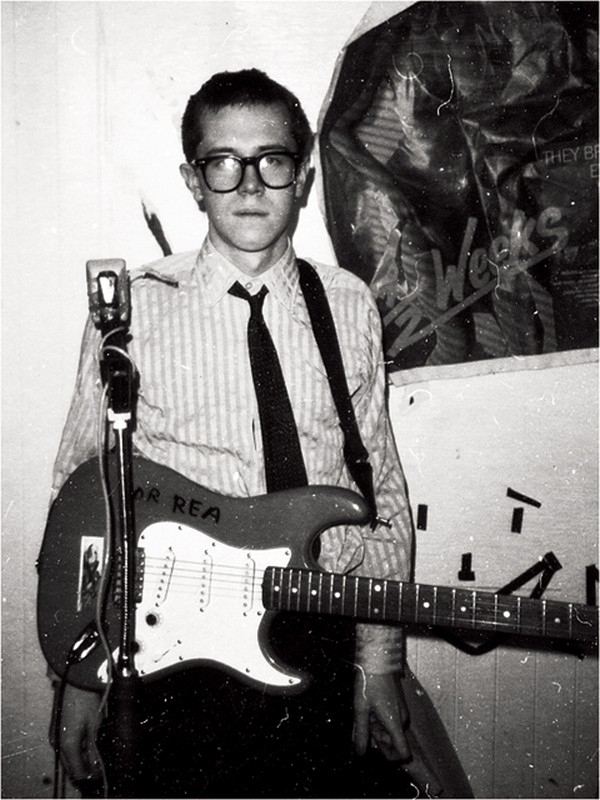 Charlotte Tobin
Charlotte Tobin
Parsnip
Whether you were in Memphis, Austin, Melbourne or anywhere else where sweet, simple things still matter, a bright light went out on a recent Wednesday morning in Waller, Texas.
Lo-fi legend Daniel Johnston was 58 when he died of a suspected heart attack, leaving a legacy of heartbreakingly melodic albums, such as Yip/Jump Music, Hi, How Are You?, and Retired Boxer. His troubled life inspired lyrics that could really put the dagger in, securing Johnston a cult-like status among his devotees. Paris Rebel Richens — songwriter, lead singer and bassist for Gonerfest-bound Melbourne pop quartet Parsnip — is one of them.
 cbc.ca
cbc.ca
Daniel Johnston
Preparing for the group’s first American tour when she got the news, Richens was devastated to hear of the great loss.
“I was pretty crushed to be honest,” she tells the Memphis Flyer on the phone before a recent gig in Kingston, New York. “I feel like he was the one artist who I knew was unwell and wouldn’t be around for much longer, so, yeah, I knew I’d be pretty sad about losing him.”
A fellow Antipodean fan myself, I know the feeling. As a Kiwi farmboy-turned-journalist whose love of Johnston was sparked by Jeff Feuerzeig’s incredible 2005 documentary, my fandom extended to my wedding in Memphis last October, when a close Kiwi mate played “True Love Will Find You in the End” while my wife walked down the aisle.
Johnston only made it Down Under once, in 2010. As well as playing Laneway Festivals in Auckland, Sydney, Brisbane, Melbourne and Perth, the celebrated songwriter held a handful of memorable side shows as well.
Richens never made it to those gigs, but recently told popular Australian music blog The Southern Sounding that Johnston’s 1984 self-released cassette album More Songs of Pain — especially the track “Poptunes” — was one of the most influential albums on her own songwriting.
Listen to the Parsnip sound and the link to Johnston is both undeniable and thoughtfully provoked. “I discovered him when I was in my late teens and going through some stuff,” Richens says. “He just has own magical world that everyone can be a part of. He had all his demons that he suffered, but he created so much joy. He was so funny as well.”
Too Young To Die: Parsnip’s Paris Richens On Daniel Johnston’s Passing
Richens has also identified the equally troubled alt-pop icon Syd Barrett as another huge influence on her songwriting. Richens says she admires lyricists who “have the freedom to be not so perfect, and a bit shambolic.”
While Richens’ appearance at Gonerfest — as both a solo artist and with Parsnip — may mark her first time at the festival or in Memphis, she has had skin in the Goner Records game for a little while now.
Richens is a member of Aussie post-punk popsters Hierophants, whose 2015 LP Parallax Error was released through Goner and Melbourne’s Aarght! Records. Goner Records also released their 7” “I Don’t Mind/The 16th.”
This time around, Parsnip are touring in support of their debut album When the Tree Bears Fruit (Trouble in Mind).
As “PP”, Richens will be doing a solo set during Gonerfest’s Friday afternoon at Memphis Made Brewing Company. In her first-ever solo set internationally, don’t be surprised if the Victorian wordsmith pays tribute to the “king of lo-fi” in what should be a fantastic late afternoon set.
“It is very sad that he is gone,” Richens says, “but [he] is still around as well.”
Parsnip performs on Saturday, September 28 at the Hi-Tone, 9:45 pm. The show is sold out, for Golden Pass holders only (no door sales). As a solo artist, Paris Richens will perform as ‘PP’ at 4:00 pm at Memphis Made on Friday, September 27. Pre-order tickets are sold out, but limited numbers will be available at the door for $10.


